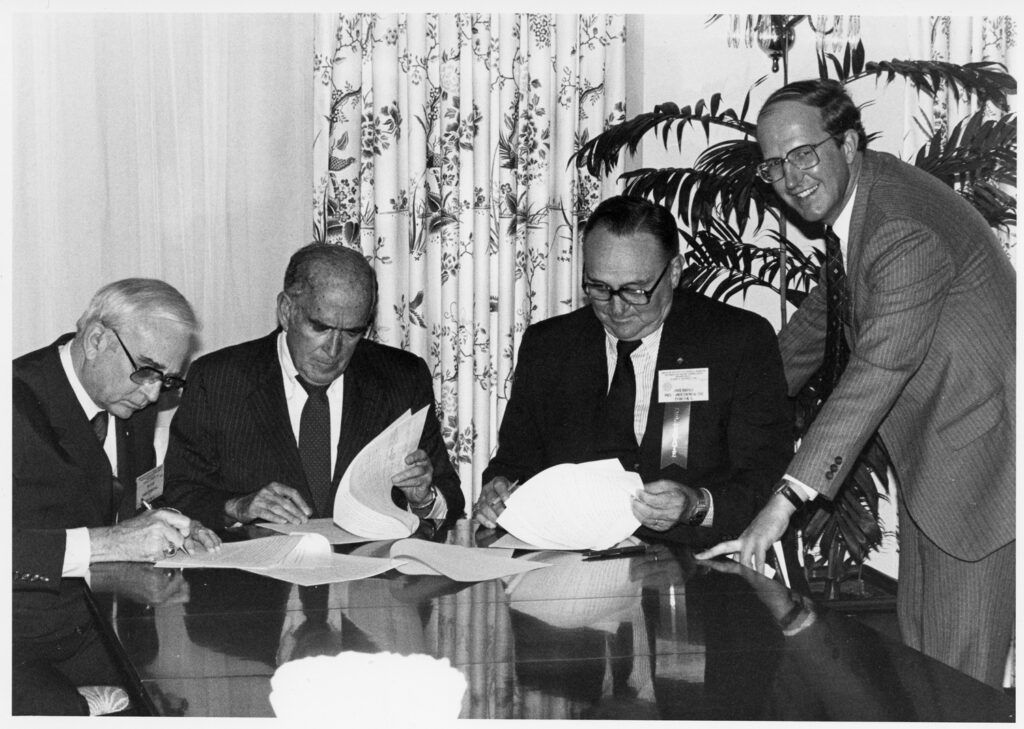Our History
The Science History Institute was formed by the merger of the Chemical Heritage Foundation and the Life Sciences Foundation.
The Institute has been led by several distinguished presidents, starting with founder Arnold Thackray, who set the organization on an ambitious course. He moved the fledgling organization from two basement rooms on the University of Pennsylvania campus to the heart of Old City Philadelphia, and shaped it into a premier institution preserving the history of chemistry, chemical engineering, and the life sciences.
Thomas R. Tritton took the helm in 2007, guiding CHF with a steady hand through the worst economic downturn since the 1930s and leading it to renewed economic health. Under his leadership CHF also greatly increased public programs and outreach.
In 2013 Carsten Reinhardt became CHF’s third president. He was an Edelstein Fellow at CHF in 1998–1999, and so he was intimately familiar with the organization’s valuable offerings. As a current professor of the history of science at Bielefeld University, Germany, Reinhardt has extensively researched and published on the impact of chemistry on society through topics including the history of industrial research, the emergence of instrumentation, and chemistry’s links to physics, biology, medicine, and technology.
In January 2017 Robert G. W. Anderson, former director of the British Museum and a member of our Board of Directors, became president and CEO. He guided CHF’s transformation into the Science History Institute in February 2018.
David A. Cole began his tenure as the Institute’s president and CEO in May 2020. He is the former executive director of the Hagley Museum and Library in Delaware, and also served as the vice president for advancement, communications, and public education at the Whitehead Institute for Biomedical Research in Cambridge, Massachusetts.
Early Years

In 1982 the Center for the History of Chemistry was launched by the University of Pennsylvania and the American Chemical Society. The American Institute of Chemical Engineers became the third sponsor in 1984. By 1987 the center was incorporated as a nonprofit organization called the National Foundation for the History of Chemistry. It was renamed the Chemical Heritage Foundation in 1992 to better reflect its interdisciplinary nature and the widening scope of its programs and activities.
A Historic Building and Renovation
In October 2008 CHF completed a massive renovation of the historic 1865 First National Bank building, home to the organization’s headquarters in Philadelphia. The renovation included conference center facilities and a new museum housing a permanent exhibition and a changing exhibitions gallery. The transformation of the space and the exhibition design were the collaborative effort of SaylorGregg Architects, CHF’s curatorial and exhibition staff, and Ralph Appelbaum Associates, renowned designers of the National Constitution Center in Philadelphia and the U.S. Holocaust Memorial Museum in Washington, D.C.
The renovated facility employs ecologically sensitive Leadership in Energy and Environmental Design (LEED) principles, including new insulation, wall tile made from recycled glass, and bathroom floors made from recycled cans.
Transforming in the 21st Century
On December 1, 2015, the Chemical Heritage Foundation and the Life Sciences Foundation finalized their historic merger. The merged organization covered the history of the life sciences and biotechnology together with the history of the chemical sciences and engineering—two of the largest and most significant branches of modern science and technology. As part of this merger, the Chemical Heritage Foundation became the Science History Institute in February 2018.
The Science History Institute stands at the intersection of science and society. The new name reflects our organization’s more expansive vision and inclusive nature, with a focus on chemistry, engineering, and the life sciences. The Institute is committed to exploring the vital roles that science and technology have played in shaping our world and how that history is crucial to the future. To that end we will continue collecting, preserving, and exhibiting historical artifacts and engaging communities of scientists and the scientifically curious public. Above all, the Institute remains committed to telling the compelling stories of the people responsible for extraordinary scientific achievement.
